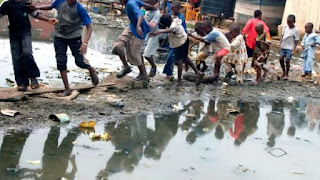Biopolitics of water supply and sanitation (II)
To follow up on bio-politics, this post will take a closer look at two urban case studies. By investigating these two African capital-cities, I will attempt to provide a more concrete insight of the bio-political aspects of water supply and sanitation policies.
1. Lagos (Nigeria)
The case of Lagos helps illuminate the differentiated impacts of poor urban sanitation and water access management. As highlighted by Gandy (2006), Lagos has seen its quality of life deteriorate in the last decades. The sewage system is "practically nonexistent". Many areas suffer from repeated flooding. What's more, Gandy noted in 2006 that at least 2/3 of childhood diseases were caused by inadequate access to safe drinking water. Lagos (and Nigeria) also severely suffer from corruption, consequently lowering the efficiency of WSS policies of any kind.
In a bio-political perspective however, the most interesting aspect of Lagos' WSS system is its privatization. In the last decades of the 20th century, the failure of the Nigerian state to provide adequate sanitation and access to water led to the partial transfer of these services to the private sector. Beside these political causes, this shift also had economic and cultural motivations: it enabled the state to save money, and it was an easy way of re-establishing "order" in the apparent "chaos" of WSS in Lagos, which was being increasingly criticized internationally. By engaging in a public-private partnership, the state thus partially denied its responsibility to provide adequate WSS, although as mentioned in my last post, this task is an inherent role of the state (Akpabio & Udofia, 2016). Coupled with dynamics of gentrification and the resulting social divide, whereby the state justifies the growing socioeconomic inequalities on hygienic (poorer areas are viewed as dirtier) and/or legal (many poor areas are informal slums) grounds, the privatization of the water system creates new forms of exclusion. Some areas within the city are seen as more political than others, which are not "politically worth it" (Akpabio & Udofia, 2016). Various discourses and practices of exclusion, and control, operate and have dramatic consequences on the population: political exclusion is a type of political control. Commodifying water resources means treating them as exclusively economic and thus helps justify its unequal distribution. But, since water is a basic human need, it should also be a right, hence it is intrinsically political, and when not treated as such, it triggers crises like the 2016 water crisis in Lagos (Reuters, 2016; The Nation, 2016).
2. Harare (Zimbabwe)
2010) investigated the causes of the major 2008 cholera outbreak and found that the state had a huge responsibility. In the early 2000s, the central government had a suspicious sudden interest in repoliticizing the water system. According to Musemwa, this sudden re-involvement was instrumental for taking some parts of the city away from the opposite political party's control. The central government's party used water shortages and other intrusive actions in order to delegitimize the opposite party in the eyes of residents living in areas governed by it. This attempt to control the population had huge negative consequences, as did Zimbabwe's Water Authority (ZINWA)'s functional inefficiency: taps went dry and a massive cholera epidemics spread out in Harare. Moreover, the cholera epidemics was made worse because the state refused to acknowledge its responsibility for months after the outbreak, in order to enhance its image abroad. Instead of taking action against cholera, state officials blamed the West. President Mugabe's infamous words on 11 December make it clear: "Cholera? What cholera?" (cited in Musemwa, 2010).
This episode can be related to Cape Town's water crisis, which I addressed in my very first post. Interestingly, this last post makes me realize the bio-political aspect of Cape Town's water crisis. Water access and sanitation is about control, bio-power, disease and sometimes death, and it impacts people unequally. I think both these examples have helped emphasize in what way(s) political decisions concerning WSS can either "make people live" or "let them die".
Sarah Champagne
1. Lagos (Nigeria)
The case of Lagos helps illuminate the differentiated impacts of poor urban sanitation and water access management. As highlighted by Gandy (2006), Lagos has seen its quality of life deteriorate in the last decades. The sewage system is "practically nonexistent". Many areas suffer from repeated flooding. What's more, Gandy noted in 2006 that at least 2/3 of childhood diseases were caused by inadequate access to safe drinking water. Lagos (and Nigeria) also severely suffer from corruption, consequently lowering the efficiency of WSS policies of any kind.
 |
| People trying to avoid stepping into dirty water in Lagos. Source: https://www.cfr.org/blog/consequences-deteriorating-sanitation-nigeria |
In a bio-political perspective however, the most interesting aspect of Lagos' WSS system is its privatization. In the last decades of the 20th century, the failure of the Nigerian state to provide adequate sanitation and access to water led to the partial transfer of these services to the private sector. Beside these political causes, this shift also had economic and cultural motivations: it enabled the state to save money, and it was an easy way of re-establishing "order" in the apparent "chaos" of WSS in Lagos, which was being increasingly criticized internationally. By engaging in a public-private partnership, the state thus partially denied its responsibility to provide adequate WSS, although as mentioned in my last post, this task is an inherent role of the state (Akpabio & Udofia, 2016). Coupled with dynamics of gentrification and the resulting social divide, whereby the state justifies the growing socioeconomic inequalities on hygienic (poorer areas are viewed as dirtier) and/or legal (many poor areas are informal slums) grounds, the privatization of the water system creates new forms of exclusion. Some areas within the city are seen as more political than others, which are not "politically worth it" (Akpabio & Udofia, 2016). Various discourses and practices of exclusion, and control, operate and have dramatic consequences on the population: political exclusion is a type of political control. Commodifying water resources means treating them as exclusively economic and thus helps justify its unequal distribution. But, since water is a basic human need, it should also be a right, hence it is intrinsically political, and when not treated as such, it triggers crises like the 2016 water crisis in Lagos (Reuters, 2016; The Nation, 2016).
2. Harare (Zimbabwe)
2010) investigated the causes of the major 2008 cholera outbreak and found that the state had a huge responsibility. In the early 2000s, the central government had a suspicious sudden interest in repoliticizing the water system. According to Musemwa, this sudden re-involvement was instrumental for taking some parts of the city away from the opposite political party's control. The central government's party used water shortages and other intrusive actions in order to delegitimize the opposite party in the eyes of residents living in areas governed by it. This attempt to control the population had huge negative consequences, as did Zimbabwe's Water Authority (ZINWA)'s functional inefficiency: taps went dry and a massive cholera epidemics spread out in Harare. Moreover, the cholera epidemics was made worse because the state refused to acknowledge its responsibility for months after the outbreak, in order to enhance its image abroad. Instead of taking action against cholera, state officials blamed the West. President Mugabe's infamous words on 11 December make it clear: "Cholera? What cholera?" (cited in Musemwa, 2010).
This episode can be related to Cape Town's water crisis, which I addressed in my very first post. Interestingly, this last post makes me realize the bio-political aspect of Cape Town's water crisis. Water access and sanitation is about control, bio-power, disease and sometimes death, and it impacts people unequally. I think both these examples have helped emphasize in what way(s) political decisions concerning WSS can either "make people live" or "let them die".
Sarah Champagne



Commentaires
Enregistrer un commentaire